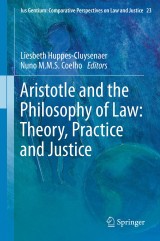Details

Aristotle and The Philosophy of Law: Theory, Practice and Justice
Ius Gentium: Comparative Perspectives on Law and Justice
|
CHF 118.00 |
|
| Verlag: | Springer |
| Format: | |
| Veröffentl.: | 14.02.2013 |
| ISBN/EAN: | 9789400760318 |
| Sprache: | englisch |
| Anzahl Seiten: | 276 |
Dieses eBook enthält ein Wasserzeichen.
Beschreibungen
<p>The book presents a new focus on the legal philosophical texts of Aristotle, which offers a much richer frame for the understanding of practical thought, legal reasoning and political experience. It allows understanding how human beings interact in a complex world, and how extensive the complexity is which results from humans’ own power of self-construction and autonomy. The Aristotelian approach recognizes the limits of rationality and the inevitable and constitutive contingency in Law. All this offers a helpful instrument to understand the changes globalisation imposes to legal experience today.</p><p>The contributions in this collection do not merely pay attention to private virtues, but focus primarily on public virtues. They deal with the fact that law is dependent on political power and that a person can never be sure about the facts of a case or about the right way to act. They explore the assumption that a detailed knowledge of Aristotle's epistemology is necessary, because of the direct connection between Enlightened reasoning and legal positivism. They pay attention to the concept of proportionality, which can be seen as a precondition to discuss liberalism.</p>
<p>1. Virtue Jurisprudence: Towards an Aretaic Theory of Law; Lawrence B. Solum.- 2. Reasoning against a deterministic/mechanistic conception of the world; Liesbeth Huppes-Cluysenaer.- 3. Law and the rule of law and its place relative to politeia in Ariostotle’s Politics; Clifford Angell Bates.- 4.The Best Form of Government and Civic Friendship in Aristotle’s Political Thought; Ki-Won Hong.- 5. Controversy and practical reason in Aristotle; Nuno M.M.S. Coelho.- 6. Aristotelian ethics and Aristotelian rhetoric; Marcel Becker.- 7. Is There Any Theory of Value in Aristotle’s Ethics?; António de Castro Caeiro.- 8. Intellectual Excellences of the Judge; Tommi Ralli.- 9. Justice kata nomos and justice as epieikeia (legality and equity); Samuli Hurri.- 10. Legality and Equity in the Rhetoric: The Smooth Transition; Miklós Könczöl.- 11. Legal rules and Epieikeia in Aristotle: Post-Positivism rediscovered; Jesús Vega.- 12. Legal Vices and Civic Virtues; Ekow N. Yankah.- 13. A neo-Aristotelian notion of reciprocity: about civic friendship and (the troublesome character of) right judicial decisions; Iris van Domselaar.- 14. Synallagma as a paradigm of exchange: reciprocity of contract in Aristotle and Game Theory; Mariusz Jerzy Golecki.- 15. The General Principle of Proportionality and Aristotle; Eric Engle.- About the Authors.</p>
<p>The book presents a new focus on the legal philosophical texts of Aristotle, which offers a much richer frame for the understanding of practical thought, legal reasoning and political experience. It allows understanding how human beings interact in a complex world, and how extensive the complexity is which results from humans’ own power of self-construction and autonomy. The Aristotelian approach recognizes the limits of rationality and the inevitable and constitutive contingency in Law. All this offers a helpful instrument to understand the changes globalisation imposes to legal experience today.</p><p>The contributions in this collection do not merely pay attention to private virtues, but focus primarily on public virtues. They deal with the fact that law is dependent on political power and that a person can never be sure about the facts of a case or about the right way to act. They explore the assumption that a detailed knowledge of Aristotle's epistemology is necessary, because of the direct connection between Enlightened reasoning and legal positivism. They pay attention to the concept of proportionality, which can be seen as a precondition to discuss liberalism.</p>
Provides a new focus on the legal philosophical research of Aristotle in the light of Globalization Brings together experts on Aristotle and lawyers, political scientists, philosophers and historians in a unique collaboration The collection is the result of an international cooperation spanning 4 years? Includes supplementary material: sn.pub/extras

















